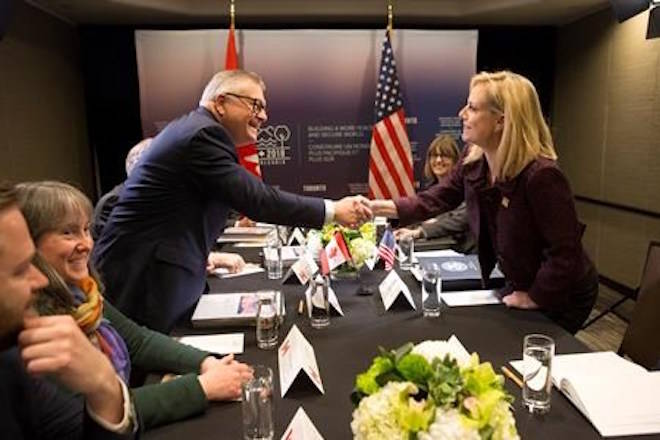Canada and its G7 partners are saying “enough is enough” to attacks by Russia and other authoritarian countries in their democratic institutions, Foreign Affairs Minister Chrystia Freeland said Monday.
Freeland concluded talks with her G7 counterparts by affirming an organized effort to respond to foreign meddling and the spreading of false information — mainly by Russia. Exactly what that means is a work in progress, but Freeland said the ministers will give their leaders recommendations on how to respond in a forceful, co-ordinated manner when they meet in Charlevoix, Que. in June.
There is a concern in the G7 countries that “authoritarian states are actively working to undermine the democratic systems in our countries and elsewhere,” she said.
“Today we said, ‘Enough is enough.’”
Freeland said there was unanimity among G7 ministers for a concerted effort to tackle Russian disinformation and meddling in the world’s democracies.
Related: G7 warned of Russian threats to western democracy
While she and British Foreign Secretary Boris Johnson displayed enthusiasm for the G7 effort to take Russia to task for what they are calling a broad range of “malign” behaviour, their American counterpart sounded a less effusive note.
U.S. Deputy Secretary of State John Sullivan didn’t bother mentioning the initiative in his closing public remarks.
Sullivan was pinch-hitting for U.S. President Donald Trump’s new pick for secretary of state, CIA Director Mike Pompeo, who faces strong opposition to his confirmation, and could not represent his country during the overlapping meeting of G7 foreign and interior ministers, which continues Tuesday.
Sullivan opted instead to highlight the North Korea nuclear crisis in his closing summit remarks, following Pompeo’s secret mission to the Hermit Kingdom two weeks ago to pave the way for a Trump meeting with its leader, Kim Jong Un.
Freeland pushed Russia to the top of a packed agenda that included North Korea, Iran, the ongoing Syrian crisis, and the Venezuela and Rohingya Muslim unrest.
Russia is, of course, a politically charged issue for Trump, with special counsel Robert Mueller investigating allegations of possible collusion between Russia and the campaign that brought the president to power in 2016.
The G7 ministers agreed in their Sunday discussion about the need to address the disruptive influence of Russia, including its interference in foreign elections and its dissemination of fake news.
“What we decided … was that we were going to set up a G7 group that would look at Russian malign behaviour in all its manifestations, whether it’s cyberwar, whether it’s disinformation, assassination attempts, whatever it happens to be and collectively try and call it out,” Johnson said.
“Russia is so unbelievably clever at kind of sowing doubt and confusion and spreading all this fake news and trying to muddy the waters. We think there’s a role for the G7 in just trying to provide some clarity.”
Freeland said she and her fellow ministers talked about “democracy being under attack, and in particular about Russian efforts to destabilize some democracies.”
Sullivan didn’t mention the Russia initiative in his summary of the talks or single out the Kremlin’s use disinformation, but he said the U.S. remains committed to the G7’s endeavour.
He called on Russia to be a “constructive partner” in Syria, where it continues to back the regime of Bashar Assad. He blasted it for the chemical weapon attack on a former Russian spy and his daughter in the British town of Salisbury. And he called on the Kremlin to give Crimea back to Ukraine and get out of its eastern region.
Sullivan also said co-operation with Russia on a variety of topics is necessary, including fighting terrorism “but that will not prevent us from standing up and confronting and taking action against Russian behaviour that’s contrary to international norms and all that we stand for in the G7.”
Afterwards, a senior State Department official, speaking on the condition of anonymity because of the sensitivity of the matter, added additional comment: “The U.S. will support its allies to combat state sponsored disinformation from Russia and other countries. This remains a priority.”
Freeland has framed the clash between democracy and authoritarianism as a defining theme of our time, with Russia as the West’s main foe on that front.
She said all citizens in democratic countries, as well as their governments have a duty to be vigilant against the disruption. She said one of her fellow ministers “pointed out that making the case for democracy can be hard sometimes … because facts can be very boring” and don’t always lead to an interesting narrative.
“Lurid conspiracy theories, on the other hand, are lurid, and exciting. Part of our job, I think, is a collective one of being aware of that fact.”
Related: Trudeau ends 3-country tour with global reputation, alliances intact
Mike Blanchfield, The Canadian Press



